Canada GDP rose 0.1% mom in August, below expectations of 0.2% mom. Goods-producing industries were up 0.2% after two months of declines, led by a rebound in manufacturing, while services-producing industries edged up 0.1%. Overall, there were gains in 14 out of 20 industrial sectors. On a three-month rolling average basis, real gross domestic product rose 0.5% in August, compared with a 0.8% increase in July.
US PCE slowed to 1.4%, core PCE slowed to 1.7%
US personal income rose USD 50.2B or 0.3% mom in September, matched expectations. Personal spending rose 0.2% mom, or USD 24.3B, matched expectations too. Headline PCE price index slowed to 1.3% yoy, down from 1.4% yoy, below expectation of 1.4% yoy. Core PCE price index slowed to 1.7% yoy, down from 1.8% yoy, matched expectations.
US initial jobless claims rose to 218k above expectation of 215k
US initial jobless claims rose 5k to 218k in the week ending October 26, above expectation of 215k. Four-week moving average of initial claims dropped -0.5k to 214.75k. Continuing claims rose 7k to 1.69m in the week ending October 19. Four-week moving average of continuing claims rose 8.75k to 1.686m.
Sentiments weighed down by talk of difficulties in US-China trade talks beyond phase one
Risk sentiments appear to be weighed down by a Bloomberg report that indicated uncertainties over a comprehensive US-China trade deal. Unnamed Chinese officials was said have warned that “they won’t budge on the thorniest issues” regarding trade negotiations. Some officials have “relayed low expectations” on future negotiations unless US would roll back more of the imposed tariffs.
For now, US and China are still on track to complete the phase one of the trade deal based on original time frame, even though the APEC summit in Chile is cancelled due to social unrest. The phase one would cover intellectual property protections, currency, financial services and agricultural purchases. But both sides are said to recognize the difficulties for negotiations beyond that.
To our understanding, the most difficult part would be on subsidies on state-owned enterprises. US would insist on China to reduce the subsidies. But it’s a fundamental principle of the state capitalism model of China that the Chinese Communist Party wouldn’t give up. It’s the key difference between China and Westerns countries which made them systematic rivals, as many described.
ECB de Guindos: Monetary policy not reached limits, but negative impact increasingly evident
ECB Vice President Luis de Guindos warned that the “collateral effects” of the ultra-loose monetary policy are “increasingly significant”. Hence, monetary policy “can’t be the only response to the economic slowdown” in the Eurozone. He added, “monetary policy can provide liquidity in the case of the risk of Brexit or trade wars, but it’s not the solution to these issues, which are the factors behind the slowdown”. He emphasized, “we can alleviate the situation but we can’t resolve it.”
De Guindos also added that “I wouldn’t say that monetary policy has in any way reached its limits, but I would say that the negative impact on financial stability is increasingly evident, which means it needs to be complemented with fiscal policy.” the advantage of negative rates is that “it has boosted investment, consumption and that’s behind the recovery”. But on the negative side, some real estate markets in Europe are of overly buoyant valuations of assets, and banks’ earnings have also taken a hit.
Separately, Governing Council member Ignazio Visco said “Eurozone inflation remains at an excessively low level and the risk of a de-anchoring of medium-long term expectations is appearing.” He added monetary policy will remain expansionary to sustain demand.
Eurozone GDP grew 0.2% in Q3, CPI slowed to 0.7% in Oct
Eurozone GDP grew 0.2% qoq in Q3, unchanged from Q2’s rate, beat expectation of 0.1% qoq. Over the year, GDP grew 1.1% yoy. EU28 GDP grew 0.3% qoq 1.4% yoy.
Eurozone CPI slowed to 0.7% yoy in October, down from 0.8% yoy, matched expectation. However, CPI core accelerated to 1.1% yoy, up from 1.0% yoy and beat expectation of 1.1% yoy.
Eurozone unemployment rate unchanged at 7.5%, lowest since 2008
Eurozone unemployment rate was unchanged at 7.5%, above expectation of 7.4%. That’s still the lowest level since July 2008. EU28 unemployment rate was unchanged at 6.3%, lowest since January 2000.
Among the Member States, the lowest unemployment rates in September 2019 were recorded in Czechia (2.1%) and Germany (3.1%). The highest unemployment rates were observed in Greece (16.9% in July 2019) and Spain (14.2%).
BoJ stands pat, new forward guidance indicates clear easing bias
BoJ left monetary policy unchanged today as widely expected, but stepped up its signal for more easing ahead. Under the yield curve control framework, short term policy interest rate was held at -0.1%. Also, the central back will continue to increase monetary base at JPY 80T a year, with purchases of JGB to keep 10-year yield at around 0%. The decision was made by 7-2 vote, with Y. Harada and G. Kataoka dissenting as usual.
The forward guidance was changed to: “As for the policy rates, the Bank expects short- and long-term interest rates to remain at their present or lower levels as long as it is necessary to pay close attention to the possibility that the momentum toward achieving the price stability target will be lost.” Previously, BoJ said its committed to keep “current ultra-low rates for an extended period of time, at least until the spring of 2020.” It’s a clear message that BoJ is ready to cut interest rates again any time if outlook deteriorates further.
At the post meeting press conference, Governor Haruhiko Kuroda confirmed that the new forward guidance aimed at clarifying the stance that “policy bias is leaning towards additional monetary easing.” Regarding the tools, BoJ could “cut interest rates, increase asset buying or accelerate the pace of increase in base money”.
China PMI manufacturing dropped to 49.3, sixth straight months in contraction
China NBS PMI Manufacturing dropped to 49.3 in October, down from 49.8 and missed expectation of 49.8. It’s the sixth straight month of contraction reading. Looking at some details, new export orders dropped for the 17th month to 47.0, down from 48.2. Employment improved slightly but remain deep in contraction at 47.3, up fro 47.0. NBS PMI Non-Manufacturing dropped to 52.8, down from 53.7 and missed expectation of 53.7. It’s also the lowest reading since February 2016.
The overall set of data suggests that while China’s growth is already at lowest pace in 30 years, there is not sign of a turn around yet. The improvements seen back in the end of Q3 were just ripples in a down trend, rather than the start of sustained recovery. The official PMIs will likely remain sluggish in the coming months while a Phase 1 US-China trade deal is unlikely to provide any immediate lift.
USD/CNH drops notably today, mainly thanks to weakness in Dollar. Rejection by 55 day EMA suggests more downside for the near term. But overall, USD/CNH is seen as in consolidation pattern from 7.1955. Hence, we’d expect strong support from 6.9909 cluster, 38.2% retracement of 6.6704 to 7.1955 at 6.9949, to contain downside to bring rebound.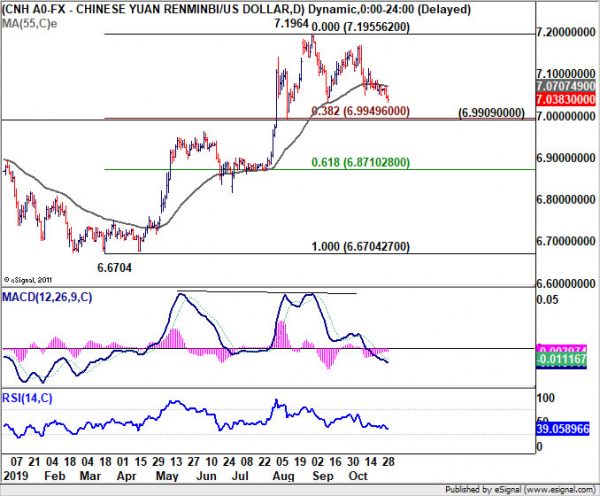
Aussie jumps after strong building permits and receding RBA cut bets
Australian Dollar surges broadly today firstly with the help from post FOMC selloff in Dollar. In the background, Aussie has been riding on optimism towards US-China trade negotiations recently. The strong housing data today also eased concerns of a renewed downturn in the housing markets. Building permits rose 7.6% mom in September, way above expectations of 0.1% mom. Other data, while missed, were not disastrous. Private sector credit rose 0.2% mom in September versus expectation of 0.3% mom. Import price index rose 0.4% qoq in Q3 versus expectation of 0.5% qoq.
As Westpac noted in a report today, RBA should stand pat at its next meeting on November 5. Market pricing of a December cut also dropped from 80% back on October 4 to 25%. But most notably, market pricing of a February cut halved from 100% on October 4 to 50% today. While the pricing of February cut was not Westpac concurs with, that’s a factor in driving the Aussie higher today.
AUD/JPY’s rebound from 69.95 extends higher today and for now, near term outlook stays bullish as long as 73.93 support holds. Next target is 76.16 cluster resistance, which is close to 100% projection of 69.96 to 74.49 from 71.73 at 76.27. Reaction to this level will decide whether AUD/JPY has reversed the larger down trend, or it’s just in corrective rise.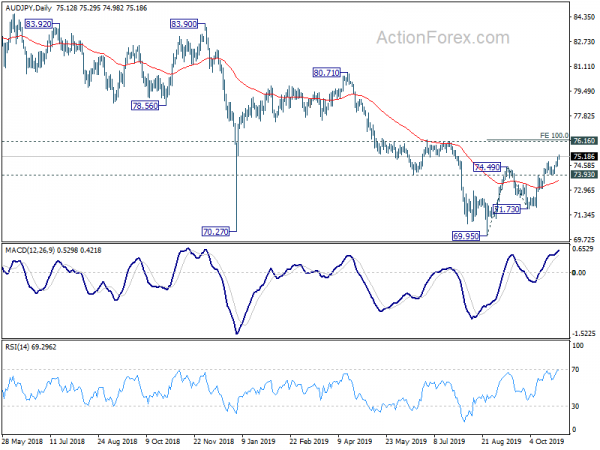
Dollar bears took control as Fed’s pause seen as non-committal
After some post FOMC volatility, Dollar bears took over the markets overwhelmingly and sent the greenback sharply lower. The key takeaway was that while Fed Chair Jerome Powell indicated a pause after overnight’s rate cut to 1.50-1.75%, he was non-committal. There was a brief lift to Dollar as he said “monetary policy is in a good place”, and it would take a “material reassessment” of the outlook for considering another rate cut again.
However, Powell did stick to script that current stance of monetary policy is likely to “remain appropriate as long as incoming information about the economy remains broadly consistent with our outlook.” It’s also mentioned in the statement the timing of future adjustments will be based on “realized and expected economic condition”, taking in to account “a wide range of information” including domestic job and inflation data, as well ass international developments. That is, Fed is maintaining a highly data-dependent approach, without closing the door for further cuts.
Trade development is something that Fed will closely monitor. Powell said “We have that Phase One potential agreement with China which, if signed and put into effect, could have the effect of reducing trade tensions and reducing uncertainty. That would bode well for business confidence and perhaps activity over time.” If the economy was to experience “a sustained reduction in trade tensions, a broad reduction in trade tensions, and a resolution of these uncertainties, that would bode well for business sentiment.
Dollar index’s decline overnight raises the chance of rejection below 55 day EMA (now at 98.13). Focus would be back on 97.14 low immediately. Break will resume the fall from 99.66. If that happens, DXY cold also finally take out 55 wee EMA decisively too. that would be a rather bearish medium term development that should send the index back to 95.84 support at least.
Dollar jumps as Fed Powell said material change needed to justify another cut
Dollar jumps after Fed chair Jerome Powell said it would take “material change” in the outlook to justify another rate cut. After today’s cut to 1.50-1.75%, he noted that risks to outlook have shifted more positively. Though, he added that Fed will need to see considerably higher inflation before considering raising interest rate.
USD/JPY surges along with the comments in the press conference. It’s now pressing 109.31 key resistance level. Decisive break there will raise the chance of medium term reversal and turn focus back to 112.40 key resistance.
Fed cuts interest rate as expected, open to more adjustment
Fed cut federal funds rate by -25bps to 1.50-1.75% as widely expected. The decision was made by 8-2 votes. Esther George and Eric Rosengren dissented and preferred to keep interest rates unchanged. James Bullard didn’t push for deeper rate cut as he did last time.
Fed seems to kept options for further easing open. It noted that “the Committee will continue to monitor the implications of incoming information for the economic outlook as it assesses the appropriate path of the target range for the federal funds rate.”
Also, “in determining the timing and size of future adjustments to the target range for the federal funds rate, the Committee will assess realized and expected economic conditions relative to its maximum employment objective and its symmetric 2 percent inflation objective.”
US still targeting to complete China trade deal phase 1 despite cancellation of Chile APEC
Even though the APEC summit in Chile in November is canceled due to social unrest, US is still aiming to complete the phase one of trade agreement with China with the same time frame.
White House spokesman Gidley said in an e-mail that “we look forward to finalizing Phase One of the historic trade deal with China within the same time frame, and when we have an announcement, we’ll let you know”.
“As of now, it appears APEC will not occur in Chile, and it’s our understanding the organization does not currently have a secondary site prepared,” he said.
A look at EUR/CAD and CAD/JPY after dovish BoC
Canadian Dollar is sold off sharply today after more dovish than expected BoC statement. USD/CAD’s rebound suggested that it has defended 1.3052 fibonacci level, thus retains medium term bullishness. EUR/CAD’s rebound now turns favor, slightly, to the case of medium term bottoming at 1.4415. It’s a bit early to call for near term bearish reversal in CAD/JPY, but the case could build up ahead.
EUR/CAD’s strong rise suggests that corrective pull back from 1.4689 has completed at 1.4455, ahead of 1.4415 low. Focus is now back on 1.4689 near term resistance. Note that bullish convergence condition in seen in daily MACD. Decisive break of 1.4689 should also have 55 day EMA sustainably taken out. Such development would suggests medium term bottoming at 1.4415. It’s early to tell if price actions from 1.4415 is developing into an up trend or a corrective rise. But in any case, break of 1.4689 should pave the way to 38.2% retracement of 1.5645 to 1.4415 at 1.4885.
CAD/JPY’s sharp decline suggests that short term top is formed at 83.55 on bearish divergence condition in 4 hour MACD. That also came after hitting 100% projection of 78.50 to 82.08 from 79.82 at 84.40. At this point, price actions from 83.55 are seen as a corrective pattern first and further rise is in favor. Break of 83.55 will target 85.23 key resistance next. However, break of 82.08 will solidify that case that corrective rise from 78.50 has completed with three waves up to 83.55. In that case, deeper fall would be seen to 79.82 support and below, to extend the consolidation pattern from 85.23.
CAD falls as BoC stands pat but revised down 2020/21 growth forecast
BoC left overnight rate target unchanged at 1.75% as widely expected. But Canadian Dollar trades generally lower as the statement is more dovish than expected. Firstly, 2020 and 2021 GDP growth forecasts are revised down. Secondly, BoC warned that “resilience of Canada’s economy will be increasingly tested as trade conflicts and uncertainty persist”, And, the central bank will monitor the “extent to which the global slowdown spreads beyond manufacturing and investment”. For Canada, focuses will be on “consumer spending and housing activity”.
BoC now projects GDP to growth 1.5% in 2019, 1.7% in 2020 and 1.8% in 2021. For 2019, growth projection was revised up from July projection of 1.3%. However, they’re notably lower than “about 2 percent in 2020 and 2021” as said in July statement. Inflation estimates are unchanged though. BoC said “CPI inflation likely will dip temporarily in 2020 as the effect of a previous spike in energy prices fades”. But, the “Bank expects inflation to track close to the 2 percent target over the projection horizon.”
Full statement below.
Bank of Canada maintains overnight rate target at 1 ¾ per cent
The Bank of Canada today maintained its target for the overnight rate at 1 ¾ percent. The Bank Rate is correspondingly 2 percent and the deposit rate is 1 ½ percent.
The outlook for the global economy has weakened further since the Bank’s July Monetary Policy Report (MPR). Ongoing trade conflicts and uncertainty are restraining business investment, trade, and global growth. A growing number of countries have responded with monetary and other policy measures to support their economies. Still, global growth is expected to slow to around 3 percent this year before edging up over the next two years. Canada has not been immune to these developments. Commodity prices have fallen amid concerns about global demand. Despite this, the Canada-US exchange rate is still near its July level, and the Canadian dollar has strengthened against other currencies.
Growth in Canada is expected to slow in the second half of this year to a rate below its potential. This reflects the uncertainty associated with trade conflicts, continuing adjustment in the energy sector, and the unwinding of temporary factors that boosted growth in the second quarter. Business investment and exports are likely to contract before expanding again in 2020 and 2021. At the same time, government spending and lower borrowing rates are supporting domestic demand, and activity in the services sector remains robust. Employment is showing continuing strength and wage growth is picking up, although with some variation among regions. Consumer spending has been choppy, but will be supported by solid income growth. Meanwhile, housing activity is picking up in most markets. The Bank continues to monitor the evolution of financial vulnerabilities in light of lower mortgage rates and past changes to housing market policies.
The Bank projects real GDP will grow by 1.5 percent this year, 1.7 percent in 2020 and 1.8 percent in 2021. This implies that the current modest output gap will narrow over the projection horizon. Measures of inflation are all around 2 percent. CPI inflation likely will dip temporarily in 2020 as the effect of a previous spike in energy prices fades. Overall, the Bank expects inflation to track close to the 2 percent target over the projection horizon.
All things considered, Governing Council judges it appropriate to maintain the current level of the overnight rate target. Governing Council is mindful that the resilience of Canada’s economy will be increasingly tested as trade conflicts and uncertainty persist. In considering the appropriate path for monetary policy, the Bank will be monitoring the extent to which the global slowdown spreads beyond manufacturing and investment. In this context, it will pay close attention to the sources of resilience in the Canadian economy – notably consumer spending and housing activity – as well as to fiscal policy developments.
US GDP grew 1.9% annualized in Q3, above expectation of 1.6%
US GDP grew 1.9% annualized rate in Q3, just slightly down from Q2’s 2.0%, and beat expectation of 1.6%. Headline PCE slowed to 1.5% qoq, down form 2.4% qoq, and missed expectation of 2.0% qoq. But Core PCE accelerated to 2.2% qoq, up from 1.9% qoq, and beat expectation of 2.1% qoq.
Looking at some details, GDP growth reflected positive contributions from personal consumption expenditures (PCE), federal government spending, residential fixed investment, state and local government spending, and exports. The were partly offset by negative contribution from nonresidential fixed investment and private inventory investment. Imports, which are a subtraction in the calculation of GDP, increased .

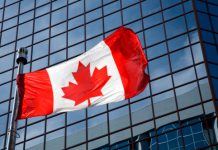


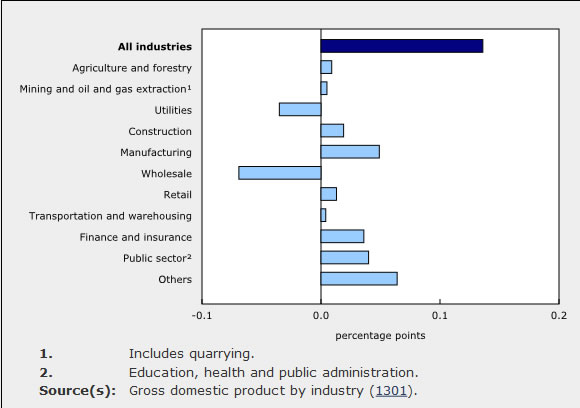
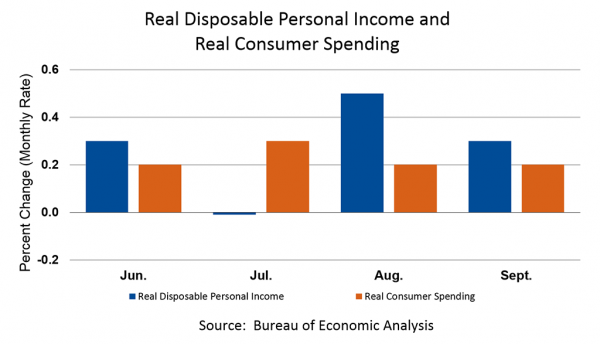
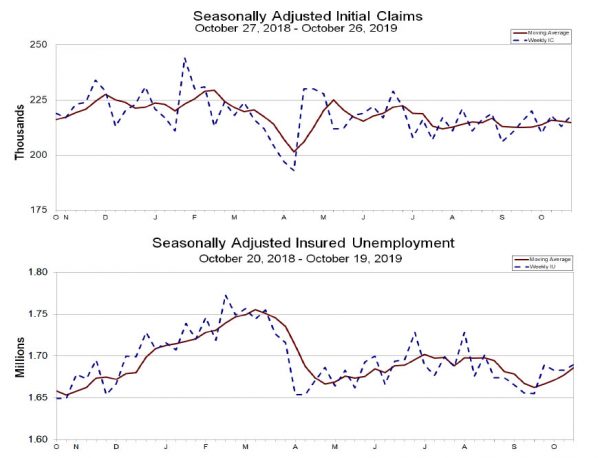
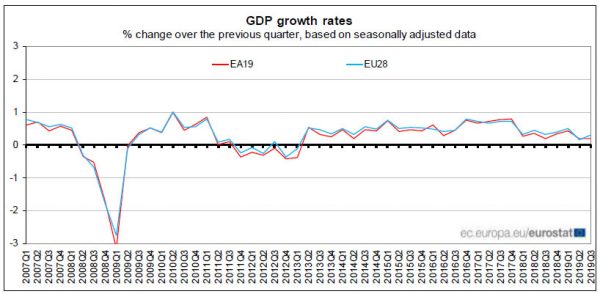
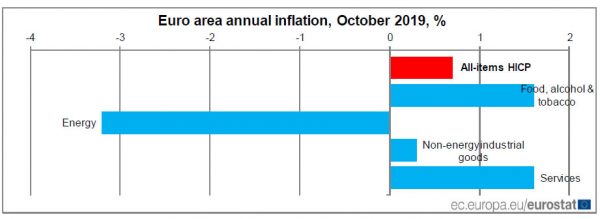
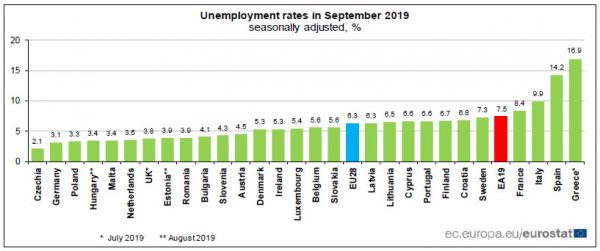
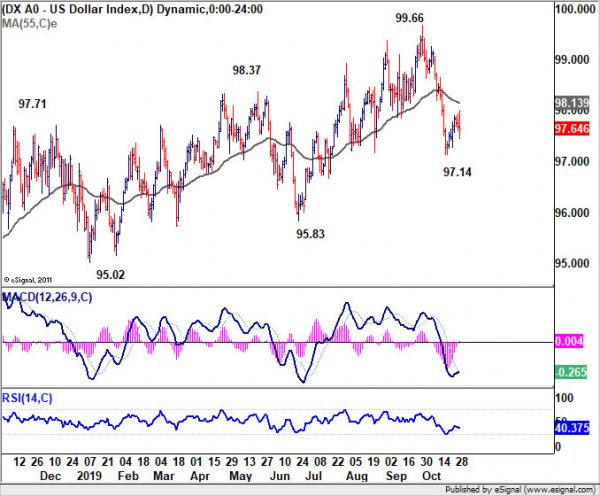
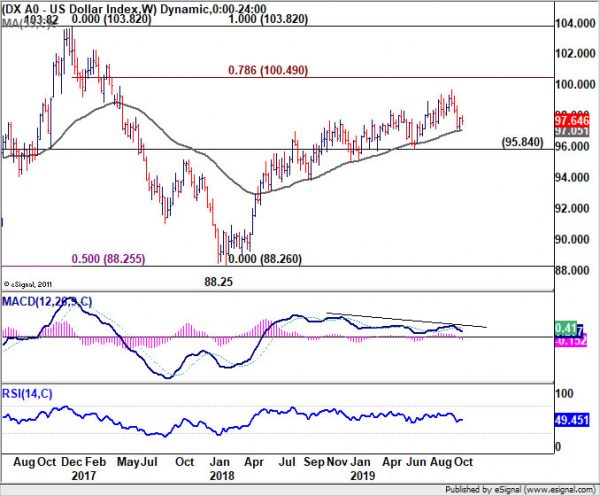
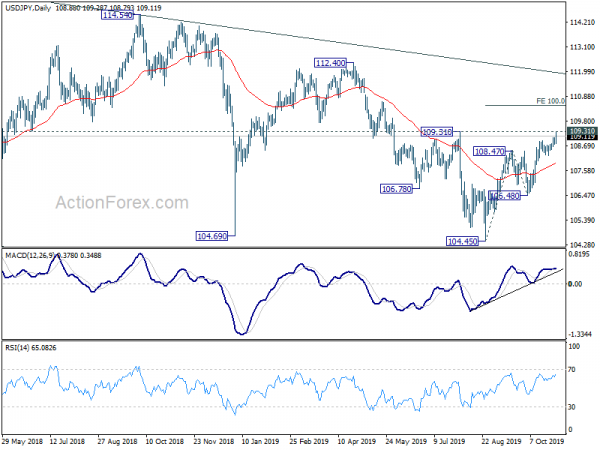

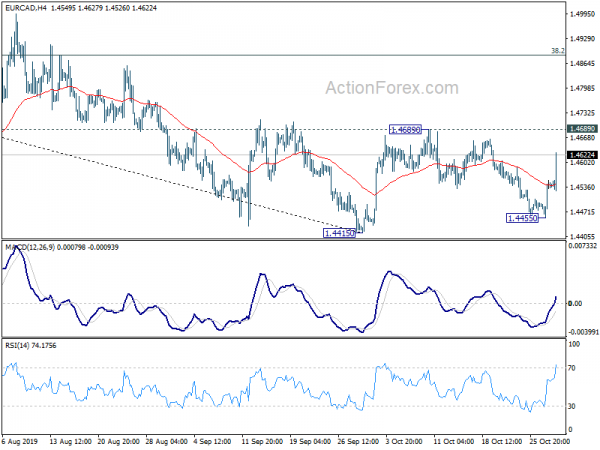
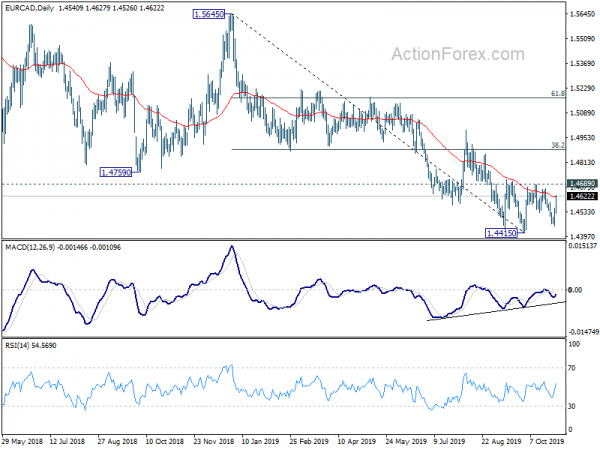
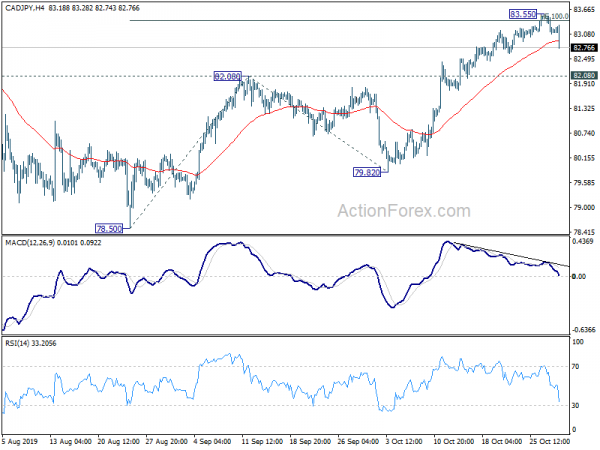
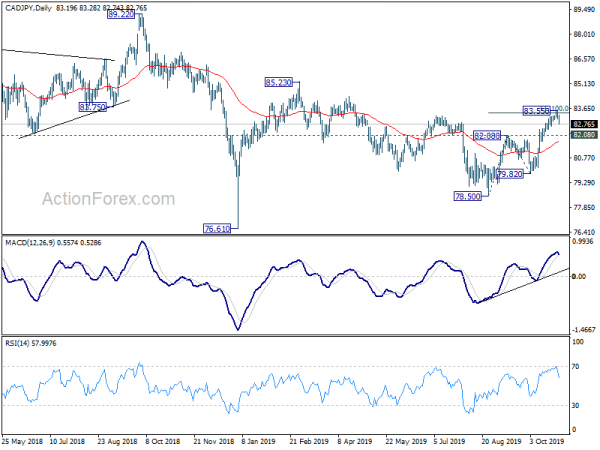
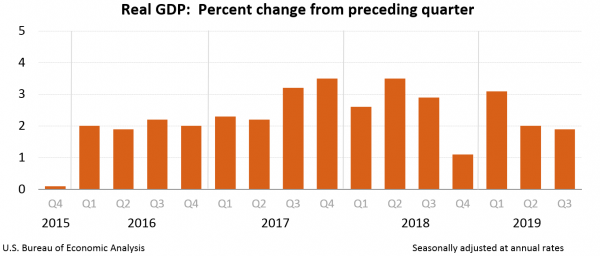

Australia AiG PMI dropped to 51.6, three of six sectors contact
Australia AiG Performance of Manufacturing Index dropped -3.1 pts to 51.6 in October (seasonally adjusted), down from 54.7. The result suggests much slower growth in the sector. In trend terms, three of the six sectors are in contraction, metal products; TCF, paper & printing; building materials, woods, furniture & other. Employment index dropped -4.8 to 52.8, indicating slower expansion, but stays above long-run average of 48.9. Average wages index dropped -4.5 pts to 59.3, just above long-run average of 59.2.
Also from Australia, PPI rose 0.4% qoq, 1.6% yoy in Q3, versus expectation of 0.3% qoq, 1.8% yoy.